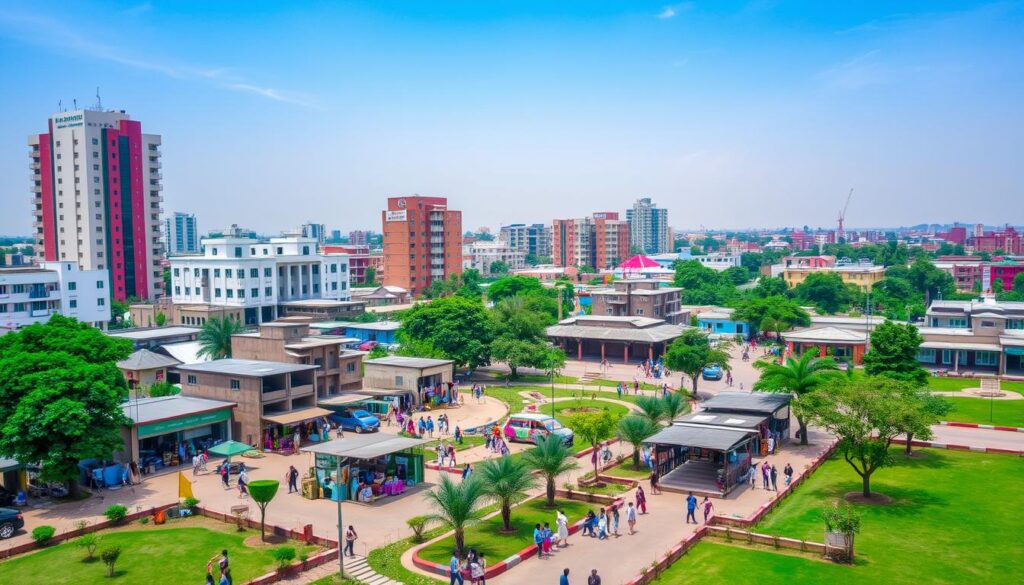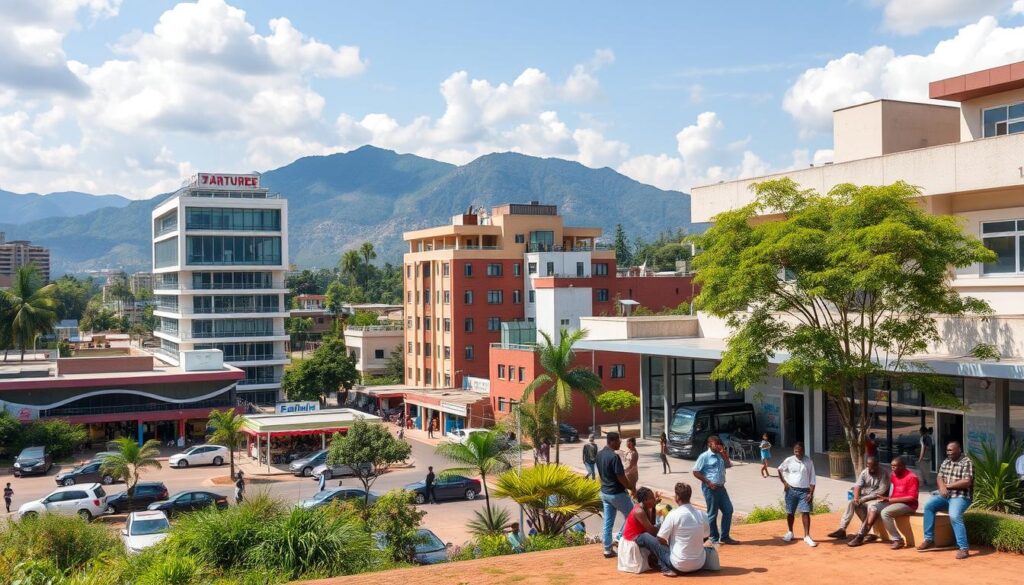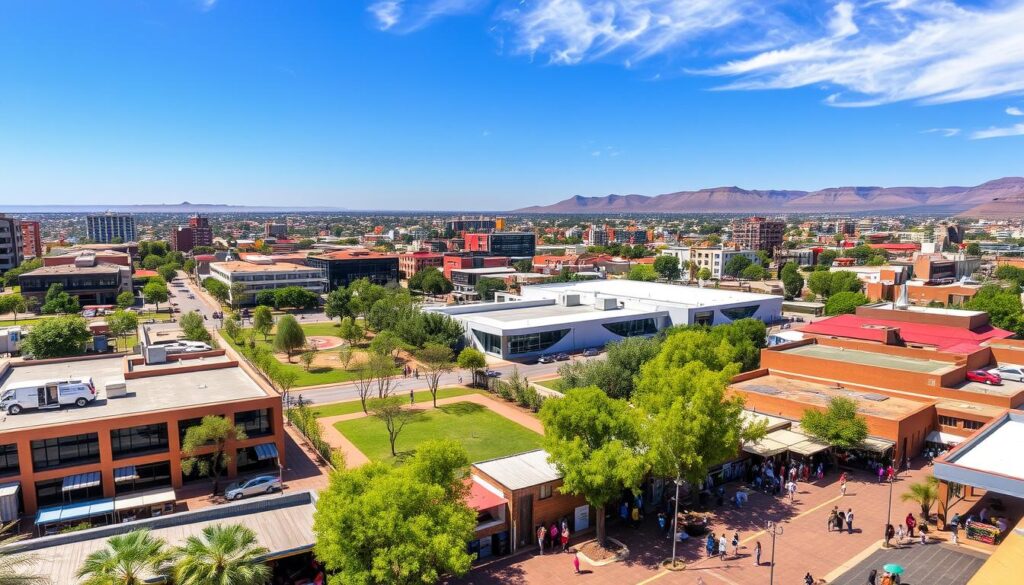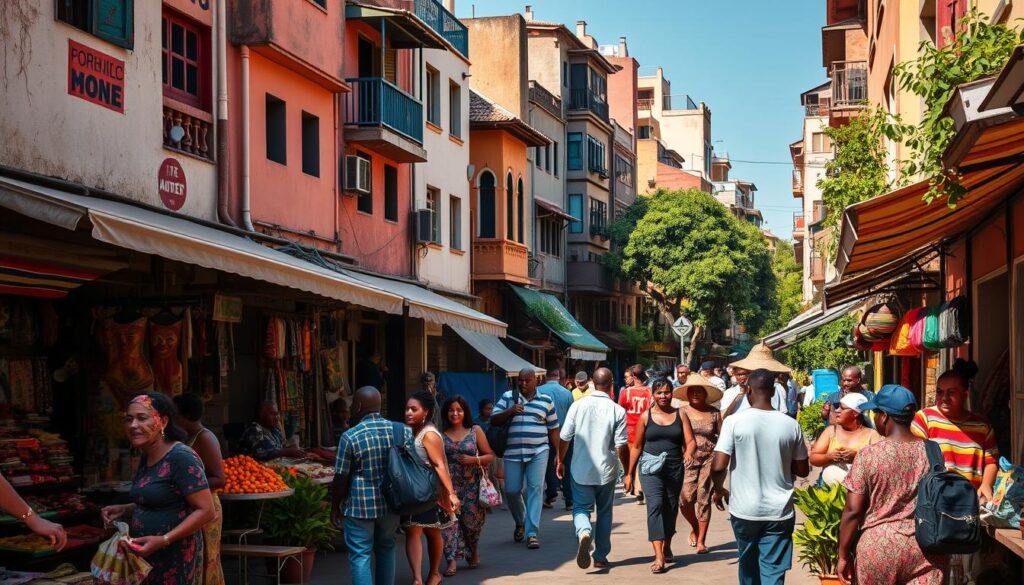Last Updated on: 25th January 2025, 05:01 am
As we look ahead to 2025, choosing the right city to call home in Africa is met with excitement and opportunity. The best places to live in Africa offer a rich tapestry of culture, economic potential, and lifestyle options that cater to various preferences. With dynamic African cities making headlines for their rapid growth and development, understanding the unique characteristics each has to offer is crucial for those considering expat life in Africa.
Factors such as safety, affordability, and quality of life play pivotal roles in the decision-making process for expatriates and locals alike. For example, Botswana has achieved significant economic success, boasting one of the highest GDP per capita in Africa, attributed to robust governance and development programs. Similarly, Rwanda has made notable strides in economic growth and social development over the past two decades1. Countries like Ghana and Mauritius stand out not only for their economic stability but also for being some of the safest African countries to live in, with a strong focus on various industries such as tourism and agriculture1.
This article will delve into the top ten cities that rank high on affordability, safety, and quality of life, providing an essential guide for anyone looking to navigate their options in Africa.
Key Takeaways
- Explore the economic advantages of various African cities with strong GDP per capita.
- Safety and political stability are crucial factors when considering the best places to live in Africa.
- Consider the cultural richness and quality of life as you choose your next home.
- Ghana and Mauritius are recognized as some of the safest places in Africa.
- Dynamic urban centers offer a blend of modernity and affordability appealing to expatriates.
Introduction to Living in Africa
Living in Africa offers a unique blend of rich cultural diversity and stunning landscapes, making it an intriguing destination for many. The continent is undergoing a significant transformation, with urbanization reshaping its cities. African urban living thrives on a vibrant lifestyle, drawing expatriates who seek economic opportunities and enriching cultural experiences.
A notable aspect of living in Africa is the vast and colorful ethnic mosaic. It influences social interactions and community dynamics, fostering a rich tapestry of connections among residents. In 2020, the United Nations Department of Economic and Social Affairs estimated that there were 7.6 million international migrants residing in West Africa2. For instance, cities like Accra boast a thriving community, with an estimated 3,000 to 5,000 African Americans living in the capital2.
Exploration of diverse cultures enhances the quality of life in Africa. The predominant religions of the region shape community events and social structure, with 51.9% identifying as Muslim, 36.4% as Christian, and 11.3% following traditional religions2. Such elements create an inviting atmosphere for newcomers keen on embracing new lifestyles.
Indeed, many cities across Africa are rising as attractive hubs for expatriates. For instance, Nigeria’s bustling Lagos is renowned for its energy and appeal, making it a common choice among newcomers seeking dynamic career paths and social environments. On the contrary, Guinea’s mining industry summons professionals looking to engage in its robust economic activities—underlining the varying opportunities across the continent.
Ultimately, living in Africa offers a myriad of possibilities, from economic engagement to cultural immersion. It becomes essential to consider personal aspirations and expectations when navigating the landscape of African cities. Collectively, the unique characteristics of African urban living contribute to a continually evolving definition of life on the continent.
| City | Estimated International Migrants | Prominent Community | Monthly Cost for Expats |
|---|---|---|---|
| Lagos, Nigeria | N/A | N/A | $600 (individual) |
| Accra, Ghana | N/A | 3,000-5,000 African Americans | Below $1,000 |
| Conakry, Guinea | N/A | N/A | N/A |
| Dakar, Senegal | 200,000 foreigners | N/A | N/A |
| Freetown, Sierra Leone | N/A | N/A | N/A |
Factors Influencing the Choice of African Cities
Choosing a city to live in across Africa requires careful consideration of various factors that significantly impact everyday life. Key aspects include safety and security, cost of living, and quality of life, which together shape the residential experience in these regions. Each city presents its unique advantages and challenges, guiding potential residents in their decision-making process.
Safety and Security
Safety in African cities is paramount for residents and expatriates alike. Various countries show different levels of crime rates and political stability, which affect the overall security perception. For instance, Mauritius is noted as the most peaceful country in Africa, boasting low crime rates and a stable political environment3. Additionally, Rwanda, often referred to as “the land of a thousand hills,” features low corruption and crime rates, making it an attractive option for those prioritizing safety3.
Cost of Living
The cost of living in Africa varies widely among different cities. For example, Egypt has been marked as the cheapest African country to live in, with monthly living costs comfortably below $4003. In contrast, Ghana is recognized for its affordable housing and transport options3. Meanwhile, South Africa stands out as one of the highest-paying countries in the continent, though the cost can correspondingly be higher3.
Quality of Life and Amenities
Quality of life in Africa is enriched by various amenities such as healthcare, education, and recreational activities. Countries like Mauritius are praised for their high standards of living, which include access to quality healthcare and a vibrant cultural scene3. Cities like Kigali in Rwanda are recognized for their cleanliness, contributing significantly to the overall quality of life3. As urban areas evolve, residents find that better access to amenities can greatly enhance their living experience.
Understanding these factors is essential for anyone considering a move to or within Africa. The interplay of safety, cost of living, and quality of life offers a diverse landscape for potential residents, making the choice of city highly personalized.
Overview of Affordability in African Cities
The affordability of living in African cities is becoming increasingly important for both locals and expatriates, especially as urban areas grow. Many cities offer a significantly lower cost of living, making them attractive to those looking to stretch their budget. According to Mercer’s Cost of Living City Ranking 2025, Abuja, Nigeria ranks the lowest at 226th, followed closely by Lagos, which is at 225th, highlighting their status as some of the most affordable African cities4. Blantyre, Malawi, also stands out at the 221st position, reinforcing the point that urban affordability in Africa can vary greatly within the region4.
Durban in South Africa is ranked as the 219th most expensive city, while Windhoek, Namibia secured the 218th position4. Interestingly, other cities like Gaborone, Botswana and Lusaka, Zambia, hold the positions of 215th and 213th, respectively4. Tunis, Tunisia, also offers relative affordability within the broader context of urban costs, sitting at the 210th position4.
As the costs of urban living can greatly influence where individuals choose to live, cities such as Cape Town, positioned at 209th, and Johannesburg, ranked 206th, showcase that even in South Africa, various urban areas have differing affordability levels4. Cities like Port Louis are identified as affordable yet safe options, attracting expatriates concerned about their living costs5.
With projections suggesting that Africa will have 1.2 billion urban dwellers by 2050, the conversation around affordable living is only set to grow6. A staggering 60-70% of urban African households currently live in slums, highlighting the urgent need for better urban planning and affordable housing solutions6.
| City | Rank | Notes |
|---|---|---|
| Abuja, Nigeria | 226 | Most affordable city according to Mercer |
| Lagos, Nigeria | 225 | Close contender in affordability |
| Blantyre, Malawi | 221 | Emerging affordable destination |
| Durban, South Africa | 219 | Noted for coastal living |
| Windhoek, Namibia | 218 | Balanced lifestyle and cost |
| Gaborone, Botswana | 215 | Affordable urban landscape |
| Lusaka, Zambia | 213 | Growing city with opportunities |
| Tunis, Tunisia | 210 | Rich in culture and affordability |
| Cape Town, South Africa | 209 | Natural beauty and affordability |
| Johannesburg, South Africa | 206 | Economic center with varied living costs |
Abuja, Nigeria: A Blend of Modernity and Affordability

As Nigeria’s capital city, Abuja Nigeria stands out for its impressive infrastructure and urban planning. Living in Abuja offers residents a unique blend of modern amenities and cultural richness. With a Mercer ranking of 226th, Abuja is recognized among the top ten least expensive cities in Africa for international workers in 2025, emphasizing its comparatively low cost of living in Abuja7.
The city boasts excellent educational institutions and healthcare facilities, making it an attractive option for families. Abuja’s healthcare system, while still developing, has made strides in recent years, focusing on accessibility and affordability. It offers an array of recreational areas such as parks and centers, providing spaces for leisure and family activities. This aspect is particularly appealing for professionals seeking a well-rounded lifestyle while maintaining a reasonable cost of living in Abuja.
Residents enjoy a mix of traditional and modern dining options, vibrant markets, and a friendly community atmosphere. As Nigeria continues to grow economically, living in Abuja represents an opportunity to experience urban life without the high price tag often associated with other capitals. The balanced lifestyle and affordability make Abuja a desirable choice for expatriates and locals alike looking to thrive.
| Factor | Details |
|---|---|
| Cost of Living Ranking | 226th (Mercer 2025) |
| Education | Multiple educational institutions, from primary to university level |
| Healthcare | Developing healthcare facilities with ongoing improvements |
| Leisure | Parks, markets, and community centers |
| Community | Mix of cultures contributing to a welcoming environment |
Lagos, Nigeria: The Vibrant Urban Experience
Lagos Nigeria stands out as one of Africa’s most vibrant cities, where a bustling urban life in Africa meets a rich cultural tapestry. With a population of around 20 million people, it is not only the largest city in Africa but also a melting pot of cultures, ideas, and opportunities8. In recent years, Lagos has witnessed a notable increase in the demand for high-end residential properties, with 78% of potential buyers favoring those with waterfront views and top-notch amenities9. This growing interest showcases the dynamic economy and rising affluence among its residents.
The lifestyle in Lagos offers diverse culinary experiences, with a steady 8% annual growth in upscale restaurants and entertainment venues10. Additionally, 55% of consumers prioritize properties with eco-friendly designs, reflecting a growing consciousness towards sustainable living9. The Instagrammable scenes at popular local spots, such as the Nike Art Gallery, which boasts 8,000 different pieces of artwork, and the vibrant atmosphere at the New Afrika Shrine, play a significant role in attracting expats looking for a lively urban lifestyle10.
However, urban life in Lagos is not without its challenges. Commuters often face traffic congestion, with daily journeys taking up to three hours each way8. This mixed experience of vibrant opportunities and logistical hurdles contributes to the complex sense of urban living in Lagos. Still, the allure of this mega city, combined with increasing investment in commercial real estate—rising by 30% over the last year—solidifies its position as a hub for business opportunities9.
To paint a fuller picture of life in Lagos, consider the following insights:
| Aspect | Statistics |
|---|---|
| Population | Approximately 20 million |
| Increase in upscale eateries | 8% annual growth rate |
| Investments in commercial real estate | 30% rise over the last year |
| Residents’ preference for eco-friendly designs | 55% |
| Time spent commuting daily | Up to 3 hours |
| Expat relocation increase | 20% rise in numbers |
Blantyre, Malawi: A Startup Haven

Blantyre Malawi stands out as an emerging hub for new businesses within the startup ecosystem in Africa. The city’s vibrant community and manageable size create a nurturing environment for entrepreneurs. This friendly atmosphere is conducive to a flourishing business culture, making living in Blantyre appealing to many.
According to recent studies, Blantyre ranks highly in terms of quality of life. The city is recognized as one of the most affordable places to live globally, where essentials such as housing and food are readily accessible at low prices11. For example, renting a four-bedroom mansion with luxurious amenities costs less than £285 a month, making it an attractive option for families and startups alike11.
The variety of social experiences available further enhances Blantyre’s appeal. Visitors can enjoy local beers and fine dining without breaking the bank, with meals in top restaurants rarely exceeding £2811. Cultural venues, like Mandala House, house local art and history, enriching the community’s spirit12.
Another key factor driving the startup ecosystem is the recent governmental support. The construction of hospitals and infrastructure reflects a commitment to public health and safety, crucial for the well-being of residents and businesses11. This continued investment adds to the favorable conditions for aspiring entrepreneurs.
In conclusion, Blantyre cultivates a unique blend of affordability, community support, and growth potential, solidifying its reputation as an attractive destination within the African startup landscape.
Durban, South Africa: Coastal Charm and Community
Living in Durban is an experience filled with charm, culture, and a sense of community. This coastal city not only captivates residents with its stunning beaches and warm weather but is also recognized for its affordability, with monthly living expenses ranging from $343 to $86213. The vibrant lifestyle in Durban reflects its diverse population, making it a welcoming place for both locals and expatriates.
Outdoor Activities and Recreation
Outdoor activities in Africa are plentiful, and Durban offers an impressive array of options. From surfing the famous waves at Umhlanga Rocks to hiking in the lush trails of the Valley of a Thousand Hills, the city encourages an active lifestyle. Family-friendly options abound, such as beautiful beaches that are perfect for picnics and relaxation.
- Surfing: Ideal spots include Durban’s Golden Mile, known for its consistent surf.
- Hiking: Trails within nearby nature reserves provide stunning views and diverse wildlife.
- Festivals: Community events celebrate local culture and traditions, adding vibrancy to everyday life.
Durban’s community vibe goes beyond the beach. It fosters a unique mix of outdoor activities that not only enhance quality of life but also attract new residents looking for adventure and connection. The city truly embodies the spirit of outdoor living in a culturally rich environment14.
Windhoek, Namibia: A Balanced Lifestyle

Living in Windhoek, Namibia, provides residents with a balanced lifestyle that combines affordability with access to nature. The city, noted as one of the cleanest and most sophisticated cities in Africa, boasts a population density that enhances its charm, with only 2.6 million inhabitants spread over an expansive area of 824,268 square kilometers1516. Situated at around 1,700 meters above sea level, Windhoek offers stunning views and a pleasant climate all year round15.
Accommodation options cater to various budgets, from €30 per night for short stays to around €500 per month for a two-bedroom apartment16. Exceptional house options can reach up to €380,000, providing potential homeowners ample choices for comfortable living16. Despite the compactness of the city, distances to shopping malls and essential services are manageable, promoting a sense of community among residents16.
The lifestyle in Windhoek blends urban living with the tranquility of nature, highlighted by the proximity to stunning landscapes such as Sossusvlei, known for its towering red dunes, and Etosha National Park, which showcases spectacular wildlife around its salt pans15. Although Windhoek’s nightlife may not rival that of major global cities, it offers a unique local flavor with popular spots like London and Vibe16.
For those seeking a quieter, yet fulfilling lifestyle, living in Windhoek is an attractive option, filled with opportunities to engage with both nature and community.
Best Places to Live in Africa: A Comparative Summary
This section presents a comparative analysis of selected African cities, focusing on the quality of life in African cities and the cost of living in African cities. Insights from various sources reveal a diverse range of experiences across the continent.
Quality of Life Rankings
As we explore the quality of life rankings, cities such as Seychelles stand out with its remarkable Human Development Index (HDI) of 0.802, marking it as Africa’s only country in the very high human development category17. Mauritius closely follows with an HDI of 0.796, reflecting high living standards. South Africa, with an HDI of 0.717, contributes to the growing list of cities where residents enjoy relatively higher quality of life17. In contrast, Somalia’s HDI stands at a disheartening 0.380, marking significant challenges in achieving a desirable quality of life17.
Cost of Living Comparison
When assessing the cost of living in African cities, significant disparities arise. Cities like Nairobi and Cape Town are known for their relatively higher cost of living compared to smaller urban areas where expenses are more manageable. Reports indicate that the rising cost of urban living affects many inhabitants, particularly in megacities such as Lagos and Johannesburg, where unemployment rates and underemployment contribute to financial strain18. As urbanization continues, the cost of living remains a pivotal factor in determining livability among African cities.
| City | HDI | Quality of Life Ranking | Estimated Monthly Cost for a Family of Four (USD) |
|---|---|---|---|
| Seychelles | 0.802 | 1 | 2,600 |
| Mauritius | 0.796 | 2 | 2,400 |
| South Africa (Johannesburg) | 0.717 | 3 | 1,800 |
| Nigeria (Lagos) | 0.548 | 4 | 1,500 |
| Somalia | 0.380 | 5 | 700 |
Expat Life in Africa: What to Expect

Living as an expat in Africa brings a unique blend of opportunities and challenges. Expats can look forward to vibrant cultures, diverse communities, and differing lifestyles across the continent. Expats should consider the cultural adaptation process as a significant part of relocating to Africa. For example, South Africa boasts around 2.8 million expatriates and multiple languages, creating a rich tapestry of multicultural interactions19.
Housing options vary greatly, with numerous cities providing modern amenities. For instance, Mauritius has emerged as one of the top destinations due to its competitive economy, translating to high earning potential for professionals20. On the other hand, cities like Addis Ababa are more expensive per capita, illustrating the importance of budgeting when moving to Africa21.
Coping with local languages is another essential aspect of expat life in Africa. In Tanzania, speaking Swahili is crucial for effective communication, as English is not widely used21. This language barrier can impact daily interactions, especially in areas with less familiarity with English.
Community integration can significantly enhance the experience of living as an expat in Africa. Expats who engage with local cultures often find deeper connections and enriching experiences. Cities like Cape Town and Durban offer a vibrant mix of cultural festivals, cuisine, and social events, providing ample opportunities to immerse oneself in the local lifestyle.
Challenges such as navigating bureaucracy or adjusting to different societal norms can arise. In some cases, strict immigration laws, like those in Tanzania, can add complexity to the relocation process21. Awareness of these challenges will assist expatriates in planning their move and settling into their new environment.
| Aspect | Considerations |
|---|---|
| Housing | Varies widely; major cities offer modern options. |
| Cultural Diversity | Enriched experiences; engage with local customs. |
| Language Barriers | Importance of local languages like Swahili in Tanzania. |
| Cost of Living | Ranges from high in Addis Ababa to more affordable in cities like Mauritius. |
| Professional Opportunities | High earning potential in places like South Africa and Namibia20. |
The allure of developing new skills and experiencing different ways of life is one of the most rewarding aspects of expat life in Africa. This journey can lead to professional growth and enhance one’s adaptability in a dynamic economic environment.
Conclusion
In 2025, Africa continues to emerge as a thriving continent offering a range of opportunities and lifestyles, making it one of the best places to live in Africa. With diverse landscapes and vibrant cultures, cities such as Dakar in Senegal and Durban in South Africa present expat opportunities in Africa that cater to various professionals, from IT experts to hospitality workers.
The rich African living experience extends beyond economic prospects; the continent is also home to breathtaking natural beauty and a myriad of recreational options. Urban areas offer a blend of modern amenities and affordable living, allowing expatriates to enjoy a high quality of life while immersing themselves in local cultures. For more insights into South Africa as a prime location for a new beginning, check out this informative article.
Ultimately, whether seeking adventure, career growth, or a community to belong to, Africa stands as a land of possibility. By choosing to explore the continent, expatriates can discover endless opportunities that promise new beginnings and vibrant experiences, reinforcing why it is considered one of the best places to live in Africa2223.
FAQ
What are the best places to live in Africa for expatriates in 2025?
What factors should I consider when moving to African cities?
How affordable are urban living costs in African cities?
Is safety a concern in all African cities?
What can expatriates expect regarding community integration in Africa?
What amenities contribute to the quality of life in African cities?
How does the cost of living in Africa compare to other regions?
What are some unique cultural experiences available in African cities?
Source Links
- https://hurghadiansproperty.com/real-estatetop-10-african-countries-to-live-in-2024/
- https://africa-housing.com/move-to-west-africa/
- https://amgrealtors.com/post/best-place-to-live-and-work-in-africa
- https://africa.businessinsider.com/local/lifestyle/top-10-most-affordable-african-cities-to-live-in-2024/5kr10k4
- https://www.yahoo.com/lifestyle/best-african-cities-expats-live-183000062.html
- https://www.worldbank.org/en/news/press-release/2015/12/01/growing-african-cities-face-housing-challenge-and-opportunity
- https://african.land/blog/article/house-hunting-in-abuja-look-no-further-than-african-lands-extensive-database-of-rentals-b989
- https://www.travelbees.de/2019/12/31/lagos-the-vibrant-heartbeat-of-africa/
- https://african.land/blog/article/top-places-to-live-in-africa-b945
- https://futurecities.ng/exploring-lagos-experience-and-essential-service-centres/
- https://www.theguardian.com/world/2001/jul/15/ameliahill.theobserver
- https://www.theguardian.com/cities/2016/feb/29/insiders-guide-blantyre-malawi-cheaper-new-york-cleaner-london
- https://nomadsnation.com/best-places-to-live-in-south-africa/
- https://aardvarksafaris.com/a-tropical-paradise-in-kwazulu-natal-south-africa/
- https://twisht.com/blog/namibia-a-fascinating-and-diverse-experience
- https://erasmusu.com/en/erasmus-windhoek/erasmus-experiences/experience-in-windhoek-namibia-by-lisa-409019
- https://en.wikipedia.org/wiki/List_of_African_countries_by_Human_Development_Index
- https://www.britannica.com/place/Africa/Demographic-patterns
- https://www.william-russell.com/blog/expat-guide-moving-living-south-africa/
- https://www.caglobalhr.com/post/live-and-work-in-africa-the-best-countries-for-expats
- https://travelnoire.com/heres-what-black-expats-wish-they-knew-before-relocating-to-east-africa
- https://african.land/blog/article/the-top-five-safest-places-to-live-in-africa-b610
- https://www.realites-senegal.sn/en/conseil-immobiliers/why-is-senegal-one-of-the-best-places-to-live-in-west-africa/

As a passionate, global-thinking Real Estate Investor I am constantly looking for the best opportunities to invest in Properties. With Aparthotel.com I am building an All-In-One Global Real Estate Platform, where people can analyse, rent or invest in properties. Additionally I help Investors with comparing the best financing options as well as give detailed Consultation on the buying process for Real Estate Investments around the world. I am looking forward to sharing my knowledge on this Website and feel free to reach out to me if you have any questions.

Comments